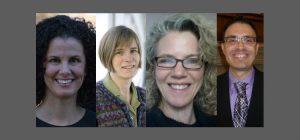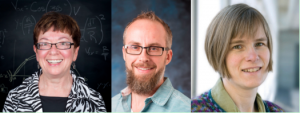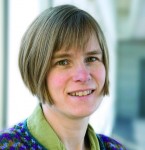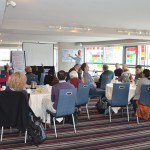Tag Archives: SoTL
Engaging Math Partner to Co-Host Webinar on Using SoTL to Tell the Story of Curriculum Development
“Evidence Matters: Using the Scholarship of Teaching and Learning to Tell the Story of Curriculum Development”
The Scholarship of Teaching and Learning (SoTL) is a form of research that involves a systematic investigation of teaching practices and student learning followed by peer review and public sharing of the work for others to build upon. This webinar begins with an overview of the key aspects of SoTL, situating it within a spectrum of scholarly work on teaching and learning. Two in-depth case studies, one involving service learning and the other involving sustainability, illustrate how SoTL can contribute to the process of developing, assessing, and disseminating curriculum. One particular SoTL component highlighted in this webinar is the role literature searches play in both shaping and refining questions as well as providing the background context required for publication. Resources for undertaking a SoTL investigation are made available to all participants.
The webinar will be held Thursday, May 5 from 12-1 pm (Eastern).
It will be hosted by:
- Dr. Jackie Dewar (Professor Emerita of Mathematics, Loyola Marymount University)
- Dr. Matthew Siniawski (Associate Professor of Mechanical Engineering, Loyola Marymount University)
- Dr. Rikki Wagstrom (Associate Professor of Mathematics, Metropolitan State University)
Engaging Mathematics Faculty Member Writes Chapter for New Book Published by MAA
Dr. Rikki Wagstrom, SENCER Leadership Fellow, associate professor of mathematics at Metropolitan State University, and Engaging Mathematics institutional partner, authored a chapter in the Mathematical Association of America’s recent book Doing the Scholarship of Teaching and Learning. Her chapter is titled “Using SoTL Practices to Drive Curriculum Development” and describes how SoTL, or the Scholarship of Teaching and Learning, influenced her Mathematics of Sustainability course development.
SENCER Leadership Fellow Jacqueline Dewar and Curtis D. Bennett edited Doing the Scholarship of Teaching and Learning. They provide the following commentary on Rikki’s chapter:
In this chapter, Rikki Wagstrom describes how she applied SoTL processes to aid in the development and evaluation of a new curriculum that integrated civic issues into a pre-requisite course for college algebra. She helps readers to understand several critical aspects of the process of doing SoTL by describing her approach to searching the literature and telling how her search led her to a useful model, one that prompted her to revise the site of her investigation and helped her re-shape her research question. She provides insights into the concerns that can arise in the selection of faculty to teach experimental and control sections, and the tough decisions that have to be made about how much data to collect.
For the Engaging Mathematics initiative, Rikki plans to develop four new modules for Mathematics of Sustainability. The modules will cover disappearing milkweed populations in the U.S. and the potential impact on Monarch butterfly populations, wind energy modeling and profitability, comparisons of greenhouse gas emissions generated by different automotive fuels, and the interplay between population growth in the U.S. and declining per capita carbon footprints. Each module will be a self-contained, portable unit suitable for use in college algebra, pre-calculus, and liberal arts mathematics courses.
To order a copy of the book, click here. You can follow Engaging Mathematics on Twitter at @MathEngaging.
Photograph courtesy of Dr. Rikki Wagstrom
Sustainable Scholarship
Dr. Rikki Wagstrom first offered a SENCER math course at Metropolitan State University, a lead institution for NCSCE’s Engaging Mathematics initiative, in the fall of 2008. At the 2006 SENCER Summer Institute, she noticed that most SENCER courses were science courses. This inspired her to SENCERize a math course, Metro State’s Math 101, by integrating it with sustainability issues. Her course design was informed by the Scholarship of Teaching and Learning (SoTL). SoTL encourages instructors to research how their teaching methods affect learning and then publicize their findings, helping to advance both the teaching and learning aspects of education.
“Using a SoTL approach forced me to think strategically about the course design,” Wagstrom says. “I knew I wanted to integrate sustainability topics into the Math 101 course, ultimately to investigate the impact on student learning. So I considered from the very beginning what aspects of student learning I was interested in studying and immediately developed preliminary assessment instruments. Having these end targets in my mind helped me focus, structure, and revise the curriculum. My SoTL work made me much more aware of the relationship between how I approach new topics and what students actually learn. By regularly evaluating my students’ work in conjunction with the SoTL project, I discovered how they made sense of the topics they were studying. I would then revise the curriculum in light of their experience and backgrounds, and outcomes subsequently improved.”
Another influence on Math 101’s SENCERization was Kennesaw State College’s Earth Algebra course, which teaches college-level algebra through the context of global warming. Earth Algebra was the result of a FIPSE-funded project. The principal investigators for the project conducted a study of the course’s effectiveness, and found that the civically centered curriculum caused students to make gains in both their views toward mathematics and their abilities to perform data analysis and mathematical modeling, while obtaining no less significant knowledge of algebra than students in traditional courses.
Dr. Wagstrom also conducted a study of her Math 101 course, but did so without the benefits of funding and collaborators, as the Kennesaw study had. Her results showed that integrating sustainability issues into her course was as effective at building students’ mathematical skills as a traditional algebra course, and often better. Additionally, it increased students’ confidence with, and interest in, the subject. An article describing Dr. Wagstrom’s research was published in the Summer 2010 issue of the peer-reviewed Science Education and Civic Engagement: an International Journal, and a detailed account of her study also appears as a chapter in Doing the Scholarship of Teaching and Learning in Mathematics.
The observed student-learning gains from Dr. Wagstrom’s Math 101 course led her to receive a Center for Teaching and Learning STEM grant from the Minnesota State Colleges and Universities system to expand her earlier work by creating a Math 102 course called Mathematics of Sustainability. This course counts for both a general education and college algebra credit, and covers mathematical topics from environmental, social, and economic perspectives.
Before she packages Mathematics of Sustainability into a teaching manual, which will be published online in December 2014 as part of the Engaging Mathematics initiative, she intends to add a two-part activity on monarch butterflies and a two-part activity on wind energy that will explore both the science and financial viability of the energy source. She would also like to develop a curriculum related to ocean acidification.
In addition, Dr. Wagstrom plans on creating new resources for a Calculus II course that will teach students to model such topics as energy consumption, population dynamics, economic multipliers, the case for buying local, and debt. She will begin developing the curriculum for this course during the fall 2014 and spring 2015 semesters. The course will be offered in spring or summer 2015, and packaged and published online by December 2015.
For updates on how Dr. Wagstrom’s course developments progress, check future issues of the eNews, and follow Engaging Mathematics on Twitter @MathEngaging to stay informed about the rest of the project.
The photograph above is licensed under Attribution-NonCommercial-ShareAlike 2.0. It appears here in its original form. © Copyright 2013 David Levinson “Monarch Butterfly on Milkweed” https://www.flickr.com/photos/davidspix/9253950982
Article originally published by Christine Marie DeCarlo on May 8, 2014.
Engaging Mathematics Partners Launch New Initiative
This past weekend, January 24-25, nineteen members of the Engaging Mathematics leadership team, including the partners, advisory board representatives, consultants, and Co-PIs, met in Jersey City, New Jersey to formally begin work on how to “make mathematics relevant to students’ lives, to connect mathematics learning to the goals and interests that students bring to college, and to show how mathematics relates to other disciplines, important civic questions, and technological challenges.”
On the first day of the meeting, the partners from the lead institutions shared and discussed details about the math curricula they had developed, including their intended audiences, the civic topics covered, and the expected rollout of each course or module. Attendees discussed strategies to expand the community of practice by reaching out to peers through academic meetings and conferences. An action planning workshop led by facilitator Jonathan Bucki helped stakeholders to specifically plot activities over the three years of the grant.
Attendees were joined by cadets from the United States Military Academy who shared their experiences with math courses that include civic issues. The cadets also demonstrated mathematical modeling on topics such as power battery loadouts for US soldiers, and the relationships between their costs and weights. Dr. Rikki Wagstrom of Metropolitan State University discussed how she incorporated the Scholarship of Teaching and Learning (SoTL) into her “Mathematics of Sustainability” course.
The second day of the meeting focused on assessment and evaluation. The independent evaluator for Engaging Mathematics, Leo Gafney, discussed his plans and methods for evaluating the project outcomes. Later, Stephen Carroll of Santa Clara University discussed guidelines and best practices for the Student Assessment of Learning Gains (SALG), which will be used to evaluate student progress in the courses.
“It was wonderful to see the enthusiasm of the project’s faculty members from different institutions as they worked together on planning and as they shared their ideas about teaching mathematics through a variety of civic issues, including environmental sustainability, energy consumption, water resources, and other topics related to local, regional or national needs. I am optimistic that the work the ‘Engaging Mathematics’ faculty are doing will be shared and serve as models (whether full courses or modules that can be used in a course) for the wider SENCER and national mathematics communities,” said Ellen Mappen, an NCSCE consultant with the project.
Following the meeting, Dr. Lynn Gieger of Oglethorpe University, a partner in Engaging Mathematics, shared that, “I came away from the weekend with a much better sense of the larger project as well as our particular role in it.” Dr. Chris Arney, professor of math and Chair of Network Science for the United States Military Academy and member of the advisory board, noted, “I do believe I was re-SENCERized.”
A page focusing on Engaging Mathematics activities and resources is now live here. Over the course of the project, a separate website will be developed and linked to this page. Visitors will be able to peruse the types of courses planned to be enhanced or developed, and additional features will be added to the site to allow project partners to share details on their course development, and once available, the results of course implementations. To learn more about the Engaging Mathematics initiative, please click here.
Article originally published by Kyle Simmons and Christine Marie DeCarlo on January 30, 2014.






